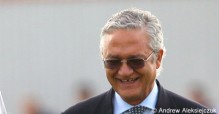QPR have confirmed that Gianni Paladini is no longer involved with the club.
The Italian was removed as club chairman immediately after the Tony Fernandes-led takeover at Loftus Road in August and has since been discussing a financial settlement.
Paladini acquired a stake in Rangers in April 2004 and three months later, following promotion from the third tier, he teamed up with Bill Power to take control in a move that led to the departures of the then chairman Nick Blackburn, chief executive David Davies and director Ross Jones.
Formerly an agent, or at least a so-called ‘middle man’ involved in representing Italian players in England, Paladini introduced a Monaco-based consortium headed by Antonio Caliendo to QPR, which brought much-needed investment.
But relations at board level deteriorated and a year after helping promote Power to the position of chairman, Paladini ousted him and chief executive Mark Devlin. Director Kevin McGrath also departed.
Rangers were plagued by a series of problems on and off the pitch in the years that followed and were on the brink of bankruptcy before a takeover by a group led by Flavio Briatore in August 2007.
The 2006 axing of Ian Holloway as manager did much to tarnish Paladini’s reputation among fans.
But Holloway was an ardent backer of Paladini in his battle for control of the club and the pair were close allies.


Only towards the end of Holloway’s time did their partnership fizzle out, and even then his removal was heavily influenced by other important figures at QPR, including the late Harold Winton, who was the club’s honorary president and a major investor.
The Briatore-led buy-out, which was secured largely by lawyer Kevin Steele – a lifelong QPR fan who at the time was on the R’s board – saw millions pumped into the club with Paladini keeping his position as chairman.
The soap opera continued and after a host of further problems and embarrassments for Rangers, Paladini was under increasing pressure from a disenchanted Briatore and the target of anger from fans.
Paladini’s allies, who frequently used the internet to boost his image among fans and wage an often bitter and deeply personal war against his opponents, therefore sought to rally supporters behind the idea of a takeover by the popular Mittals.
In 2010, Briatore relinquished the title of company chairman and Amit Bhatia, son-in-law of Lakshmi Mittal, took on a more prominent role. It was suggested that Briatore had effectively been ousted by the Mittal family.
That was never the case, and by March this year, with Rangers on course for the Premier League, Briatore and co-owner Bernie Ecclestone were keen to exert more obvious control and the scale of Paladini’s involvement, which tended to vary throughout his time at QPR, was increased again.
Paladini and his supporters always believed a Mittal-led takeover would strengthen rather than weaken his position – hence the drumming up of support for Bhatia – and for a long time they were correct.
But by the time Fernandes entered the scene last summer and joined forces with the Mittals, the tide had turned against Paladini.
He had come close to being axed on several occasions in recent years, such as around the time of Iain Dowie’s sacking as manager in 2007 and the desperate pursuit of midfielder Ben Watson two years later – a deal Briatore was keen to be completed – yet Paladini repeatedly managed to cling on.
But the removal in May by Briatore of Ishan Saksena in the wake of the FA inquiry into the 2009 transfer of Alejandro Faurlin and the Argentine’s subsequent contract extension was arguably a turning point.
Saksena is a friend and highly trusted employee of the Mittals who was not even at QPR when Paladini oversaw Faurlin’s move to west London.
His exit caused acrimony and made actual rather than cosmetic change certainty once Fernandes took over and Bhatia resumed the role of company vice-chairman, which he had resigned from following Saksena’s sacking.
Bhatia, who had received a number of letters from fans urging him to fire Paladini following the apparent Mittal takeover of 2010, moved quickly to make the change once the Briatore era was truly ended.
Paladini was removed not only as chairman but as QPR’s representative at away matches and the like, and his involvement in football matters virtually ended, making the eventual announcement of his departure a mere formality.
This post was last modified on 21/11/2011